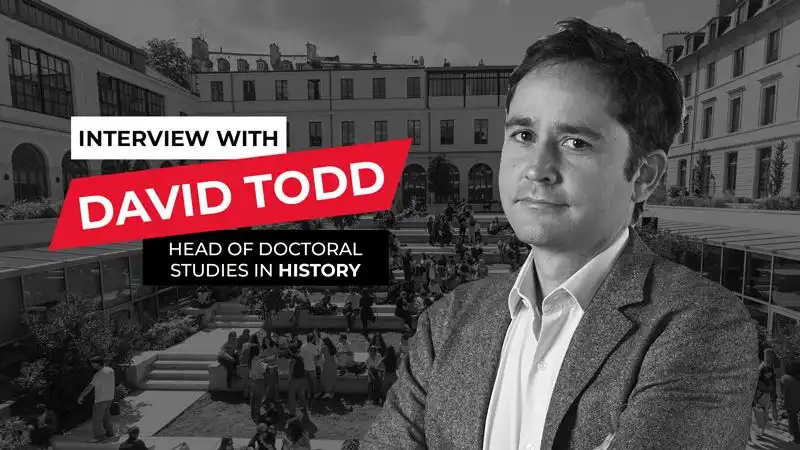Home>Interview with David Todd, Head of Studies in History
21.07.2025
Interview with David Todd, Head of Studies in History

Want to write a thesis in History? A core subject taught from the Undergraduate College, History is also one of the pillars of research at Sciences Po. What kind of research is carried out in History at Sciences Po? How can you find a thesis topic in this discipline? Advice and answers from David Todd, university professor at Sciences Po, affiliated with the Centre for History and Head of studies in History.
Could you tell us about your ACADEMIC background?
After graduating from the Institut d'Études Politiques, in the ‘Public Service’ section (equivalent to ‘Public Affairs’ at Sciences Po today), I completed a research master's degree and then a PhD in history at Cambridge. I then did postdoctoral research at Cambridge and at the Joint Centre for History and Economics at Harvard and Cambridge, before spending ten years as a lecturer and researcher at King's College London. Finally, I joined the Centre for History as a university lecturer in September 2021.
What research activities do you conduct at the Centre for HistorY at Sciences Po? What sparked your interest in this field?
I study the history of political economy and the history of empires in the 19th century. I became interested in these subjects because they helped me understand the origins of liberal globalisation in the early 21st century. Today, they still help me understand why it is being challenged. I am currently working on a book about French imperial ambitions since the 17th century. I have also started a new project on the silk industry and its role in the advent of contemporary capitalism between 1750 and 1914. In addition, since 2022, I have been coordinating the Centre for History and Economics in Paris (CHEP), hosted by the Centre for History, which encourages historical research on all aspects of economic life, in collaboration with our partners at Cambridge and Harvard.
You have been appointed HEAD of Doctoral Studies in History. What makes supporting students so interesting?
There is a particular pleasure in helping young researchers. Their enthusiasm is inspiring. My first priority is to consolidate the resources available to them to carry out their research. I would then like to continue encouraging their international outlook, through the topics they research and their mobility in other countries. Finally, I want to strengthen the support they receive in finding opportunities in French and foreign universities and in all fields where the ability to carry out ambitious projects is valued.
In your opinion, what are the keys to a successful PhD?
At the beginning, you need to keep an open mind so that your research project can evolve based on suggestions and discoveries. Then, in the final stretch, you have to make choices and stick to them. Above all, you must not lose sight of your own well-being. A PhD is as much a psychological challenge as it is an intellectual one. Learning to overcome these difficulties is what makes a PhD so valuable as an educational experience.
Why is it important to fully integrate doctoral students into the Centre FOR History, and what benefits can they derive from this?
When you embark on a PhD, you join a community of researchers. This community is a forum for intellectual exchange, but also for support and mutual assistance. PhD students going through difficult phases can rely on their peers, as well as postdoctoral researchers and members of the permanent faculty. The excellent facilities available to doctoral students, including several workspaces reserved for them at the Centre on the Saint-Thomas d'Aquin campus, facilitate their integration. They are also encouraged to contribute to the teaching of history on all Sciences Po campuses. This further accelerates their integration and allows them to enhance their CVs.
What advice would you give to students wishing to pursue a PhD in History?
Take the time to prepare a solid proposal before applying. Position it within the existing body of historical work and cite the sources you intend to use. Highlight the significance of your research: what will it contribute to the field of historical studies? Consult with historians, particularly your future thesis supervisor, and incorporate their feedback to improve your proposal. Take into account the time constraints and other factors that affect any doctoral project. Your project must be realistic. But remain ambitious in your intellectual and professional goals.
Find out more
- About David TODD and the Centre for History
- About the Master's programme in History
- About the Doctoral programme in History
